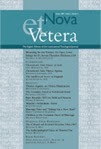Aristotle, Searle, and computation in Nova et Vetera (UPDATED)
 My article “From Aristotle to John Searle and Back Again: Formal Causes, Teleology, and Computation in Nature” appears in the Spring 2016 issue (Vol. 14, No. 2) of
Nova et Vetera
. There is also a response to the article by Fr. Simon Gaine. These papers were presented at the symposium on the theme What Has Athens to Do with Jerusalem? that was held at the Dominican School of Philosophy and Theology in Berkeley in July of 2014, and the issue contains all the other plenary session presentations (by Fr. Michael Dodds, Alfred Freddoso, John O’Callaghan, Fr. Michał Paluch, John Searle, Fr. Robert Sokolowski, and Linda Zagzebski), along with the responses to those presentations.There is a lot of new material in my paper, and in particular a much more detailed analysis of the notion of computation than I’ve given elsewhere, and fairly extensive interaction with the literature on Searle’s argument for the observer-relativity of computation. Here are the opening paragraphs of the paper, which will give the interested reader an idea of what’s in it:
My article “From Aristotle to John Searle and Back Again: Formal Causes, Teleology, and Computation in Nature” appears in the Spring 2016 issue (Vol. 14, No. 2) of
Nova et Vetera
. There is also a response to the article by Fr. Simon Gaine. These papers were presented at the symposium on the theme What Has Athens to Do with Jerusalem? that was held at the Dominican School of Philosophy and Theology in Berkeley in July of 2014, and the issue contains all the other plenary session presentations (by Fr. Michael Dodds, Alfred Freddoso, John O’Callaghan, Fr. Michał Paluch, John Searle, Fr. Robert Sokolowski, and Linda Zagzebski), along with the responses to those presentations.There is a lot of new material in my paper, and in particular a much more detailed analysis of the notion of computation than I’ve given elsewhere, and fairly extensive interaction with the literature on Searle’s argument for the observer-relativity of computation. Here are the opening paragraphs of the paper, which will give the interested reader an idea of what’s in it:Talk of information, algorithms, software, and other computational notions is commonplace in the work of contemporary philosophers, cognitive scientists, biologists, and physicists. These notions are regarded as essential to the description and explanation of physical, biological, and psychological phenomena. Yet, a powerful objection has been raised by John Searle, who argues that computational features are observer-relative, rather than intrinsic to natural processes. If Searle is right, then computation is not a natural kind, but rather a kind of human artifact, and is therefore unavailable for purposes of scientific explanation.
In this paper, I argue that Searle’s objection has not been, and cannot be, successfully rebutted by his naturalist critics. I also argue, however, that computational descriptions do indeed track what Daniel Dennett calls “real patterns” in nature. The way to resolve this aporia is to see that the computational notions are essentially a recapitulation of the Aristotelian-Scholastic notions of formal and final causality, purportedly banished from modern science by the “mechanical philosophy” of Galileo, Descartes, Boyle, and Newton. Given this “mechanical” conception of nature, Searle’s critique of computationalism is unanswerable. If there is truth in computational approaches, then this can be made sense of, and Searle’s objection rebutted, but only if we return to a broadly Aristotelian-Scholastic philosophy of nature.
The plan of the paper is as follows. The next section (“From Scholasticism to Mechanism”) provides a brief account of the relevant Aristotelian notions and of their purported supersession in the early modern period. The third section (“The Computational Paradigm”) surveys the role computational notions play in contemporary philosophy, cognitive science, and natural science. The following section (“Searle’s Critique”) offers an exposition and qualified defense of Searle’s objection to treating computation as an intrinsic feature of the physical world—an objection that, it should be noted at the outset, is independent of and more fundamental than his famous “Chinese Room” argument. In the fifth section (“Aristotle’s Revenge”), I argue that the computational paradigm at issue essentially recapitulates certain key Aristotelian-Scholastic notions commonly assumed to have been long ago refuted and that a return to an Aristotelian philosophy of nature is the only way for the computationalist to rebut Searle’s critique. Finally, in “Theological Implications,” I explore ways in which computationalism, understood in Aristotelian terms, provides conceptual common ground between natural science, philosophy, and theology…
UPDATE 5/20: Readers who use Project MUSE can get online access to my article and the rest of the articles from the current issue of Nova et Vetera.
Published on May 12, 2016 09:37
No comments have been added yet.
Edward Feser's Blog
- Edward Feser's profile
- 330 followers
Edward Feser isn't a Goodreads Author
(yet),
but they
do have a blog,
so here are some recent posts imported from
their feed.



